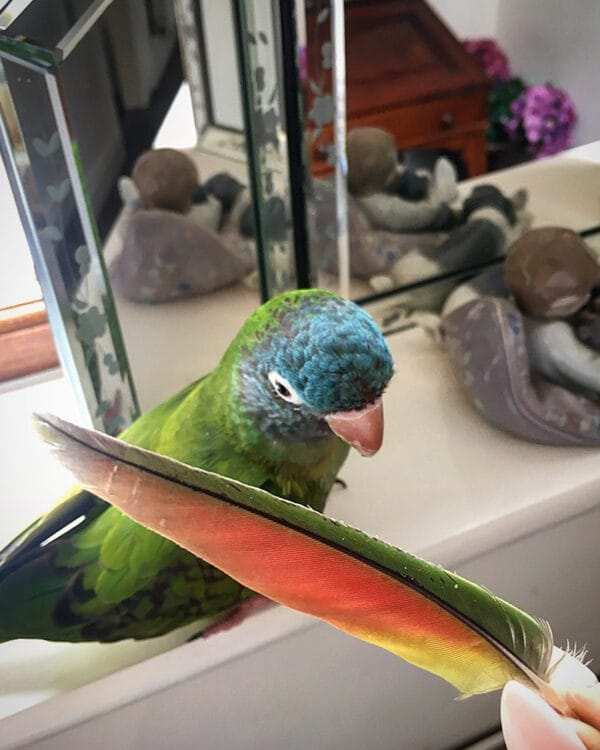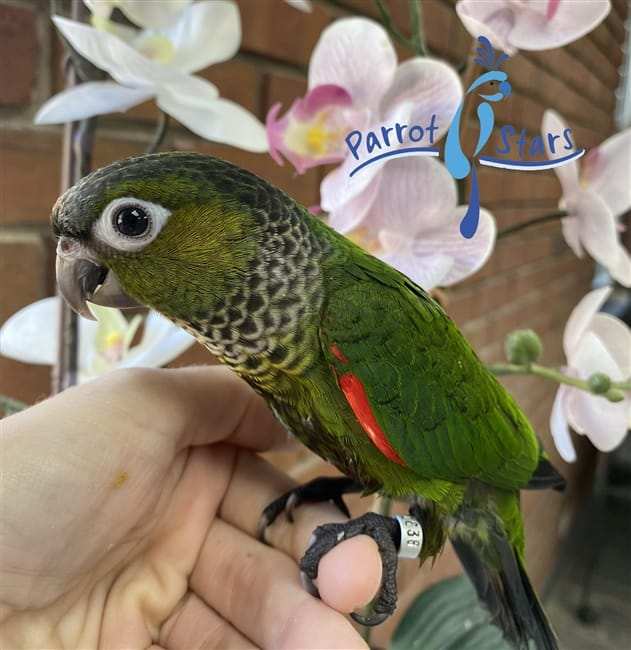Black-Capped Conure (Rock Parakeet)
The Black Capped Conure is one of the smallest of the conure parrots, as well as one of the most distinctive in appearance with its brownish-black crown and scale-patterned neck. Black cap Conure can be slightly shy, but once comfortable with their adopted family; they are an inquisitive and loving pet. This bird has the notable advantage of being a quieter species than other conures.
Black-Capped Conure (Pyrrhura rupicola) Overview
- Common Names: Black-capped conure, rock parakeet, black-capped parakeet, Sandia conure
- Scientific Name: Pyrrhura rupicola
- Subspecies:
- Pyrrhura rupicola rupicola – Native to central Peru
- Pyrrhura rupicola sandiae – Native to central and southeastern Peru, northern Bolivia, and southwestern Brazil
- Subspecies:
- Adult Size: 9 to 10 inches
- Life Expectancy: Up to 30 years in captivity
Coco – Blue Crown Conure
Black capped conure
Origin and History
The Black cap Conure is native to areas of South America, including Peru, Bolivia, and southwestern Brazil. It lives in humid forest ranging from the Amazonian lowlands up to the slopes of the eastern Andes to an altitude of about 6,000 feet. Because much of this bird’s native habitat is being disturbed, it is a “near threatened” species for extinction.
Temperament
Black-capped conures make beautiful, fun-loving pets. While they do require a great deal of attention from their owners, they always seem to reward human efforts with their hilarious antics. They enjoy interacting with their owners and crave daily playtime and attention. These birds will become easy-going and friendly with family members but can remain a bit shy with strangers.
Black capped conure price do best in a household that is active and bustling, as the activity keeps them interested and stimulated. If you are interested in a black-capped conure, make sure you have plenty of time to socialize and interact with the bird.
Highly social and trainable, these intelligent creatures can get bored if not mentally stimulated or ignored. Even hand-raised parrots can reject human interaction if left alone for long periods or if they feel neglected. A lonely bird can become depressed and develop both medical and behavioral problems as a result.
Speech and Vocalizations
This bird is one of the quieter of the conure species. It is not known to be one of the best talkers, but with patient training, the Black cap Conure can learn a small repertoire of words and phrases.
Black-Capped Conure Colors and Markings
The black-capped conure is a mostly green bird with an unusual brown-black cap and whitish scale pattern on the neck and breast. It has touches of red along the leading edge of the upper wing coverts. The green abdomen is tinged with bluish marking, and the tail feathers have dark gray undersides. The feet, legs, and beak are gray. Males and females are identical in coloring. The only way to tell the sexes apart is through DNA testing or a surgical sexing procedure.
One mutation of this species, the yellow-sided Black cap Conure, has yellow shading on the sides of the head and neck.
Caring for the Black-Capped Conure
In nature, black-capped conures form flocks of about 30 birds. In captivity, they will do best in an environment with a lot of noise and activity. Black-capped conures thrive when there is social interaction with their human family.
Be prepared to give your conure two to four hours of out-of-cage time for exercise and interaction. Make sure to supervise this time, as this curious bird can quickly get into trouble if not watched. Beware of this bird chewing on furniture or wires or making attempts to fly out of open doors, windows, or near operating ceiling fans.
A black cap conures needs a cage large enough to provide space for daily exercise. The smallest acceptable cage is 18-inch long and wide and at least 2-feet high. If you will not be able to offer several hours of out-of-cage time daily for flying and playing, then the bird will need a larger cage that allows it to fly and exercise on its own.
Provide sturdy perches within the cage, as well as plenty of chew toys. Change the toys frequently to keep the bird curious and stimulated. Provide an out-of-cage play apparatus like a playpen or play gym for the bird to use during its out-of-cage exercise periods.

Common Health Problems
Conures, in general, are among the hardiest of parrots; many owners may never experience a severe health problem. Like other black capped conure price, though, the black cap conures can be prone to feather picking, which is usually a sign the bird is bored and in need of more attention and stimulation.
Infrequently, a conure can get ill from diseases that commonly affect other parrots. These diseases include proventricular dilatation disease (an avian viral disease), psittacine beak and feather disease (a viral disease), psittacosis bacterial infection, beak malocclusion (beak overbite), and aspergillosis fungal infection.
Diet and Nutrition
In the wild, these birds eat a variety of fruits, vegetables, nuts, and berries. In captivity, feed your bird a high-quality, formulated pellet along with a daily diet of fresh fruits and vegetables.
You can give them an unlimited amount of pellet food; they will only eat what they need. As for fresh fruits and veggies, offer about a 1/8 to 1/4 cup in the morning and at night.
Exercise
All conures are active birds, and this is especially true of the black-capped conure. To keep your bird healthy and in good physical condition, your pet bird will need at least 2 hours of out-of-cage time each day in a safe, supervised play area.
Your bird will need a nice variety of chew toys that it can use to exercise its jaw muscles and provide mental stimulation. Several perches of different diameters will help keep your parrot’s feet limber.
Pros
Curious, loving pet with its adopted human family
Quieter species, it can still learn to speak a few words
Small bird that can be housed in a smaller cage taking up a smaller footprint
Cons
Not the best talker
Requires at least two to four hours of supervised out-of-cage exercise
Tends to be shy with strangers
Where to Adopt or Buy a Black Cap Conures
It’s always worth checking with animal rescue organizations and animal adoption agencies if you are interested in owning a black cap conures. Occasionally birds are abandoned by owners unable to provide for their needs. Otherwise, you will likely need to seek a breeder to obtain a black-capped conure; they are not commonly sold in pet stores. You can expect to pay from $400 to $600 for one.
Rescues, adoption organizations, and breeders where you can find black-capped conures include:
- Birds Now
- Bird Breeders
- Rescue the Birds
If you’re going the breeder route, make sure that the breeder is reputable by asking them how long they’ve been breeding and working with black-capped conures. Carefully inspect a bird before taking it home. A healthy bird is alert, active, has bright eyes, clean feathers, and full crops.



